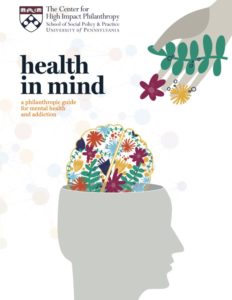The Penn Center for High Impact Philanthropy (CHIP) has published Health in Mind, a new guide to help donors answer the urgent need for mental health and addition support services with effective approaches that offer hope.
There has never been a more urgent time to address mental health and addiction. In the United States, one in five people experience a mental health disorder in their lifetime, contributing to rising rates of so-called deaths of despair—those related to drugs, alcohol, or suicide. Beyond the devastating loss of human life, these two conditions impact society in other serious ways, including increased healthcare costs, reduced workforce productivity, and over-taxed social services
But there is hope. In recent years, researchers and clinicians have gained a greater understanding of mental health disorders and substance use disorders (SUDs). We now have deeper knowledge about the brain and evidence about which approaches are most effective at preventing, treating, and supporting the recovery or long-term management of these conditions.
In Health in Mind: A Philanthropic Guide for Mental Health and Addiction, the Penn Center for High Impact Philanthropy identifies approaches that are most effective at preventing, treating, and supporting the recovery or long-term management of mental health conditions and substance use disorders. In this guide, donors will find:
- Five strategies funders can use to address mental health and addiction
- Evidence for the opportunities that have the greatest potential for impact
- A range of solutions and philanthropic opportunities for each strategy
CHIP, which is housed at the Penn School of Social Policy & Practice, is partnering with Peg’s Foundation, Scattergood Foundation, the AmerisourceBergen Foundation, the John Heller Fund, The Kennedy Forum and other partners, to help get the word out to the widest range of donors on how to make an impact on individuals, families, and communities who are experiencing the effects of mental health disorders and addiction.
“Mental health conditions and substance use disorders (SUDs) affect thousands of individuals and families nationwide and are tightly linked to other social impact areas, including homelessness, incarceration, education, and foster care. In our latest guide, Health in Mind, we show how donors can help,” said Katherina Rosqueta, founding executive director of the Center for High Impact Philanthropy at Penn’s School of Social Policy & Practice. “There are a range of philanthropic approaches that can enable these individuals, their families, and communities to thrive.”

